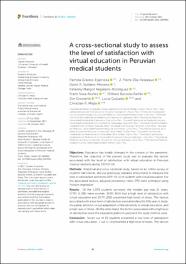A cross-sectional study to assess the level of satisfaction with virtual education in Peruvian medical students

View/
Download
(application/pdf: 467.5Kb)
(application/pdf: 467.5Kb)
Date
2022-10-05Author(s)
Grados-Espinoza, Pamela
Zila-Velasque, J. Pierre
Soriano-Moreno, David R.
Regalado-Rodríguez, Kateriny Margot
Sosa-Nuñez, Frank
Barzola-Farfán, William
Gronerth, Jim
Guizado, Lucia
Mejia, Christian R.
Metadata
Show full item recordAbstract
“Objectives: Education has totally changed in the context of the pandemic.
Therefore, the objective of the present study was to evaluate the factors
associated with the level of satisfaction with virtual education in Peruvian
medical students during COVID-19.
Methods: Analytical and cross-sectional study, based on an online survey of
students nationwide. We use previously validated instruments to measure the
level of satisfaction and stress (EPP-10-c) of students with virtual education. For
the associated factors, adjusted prevalence ratios (PR) were estimated using
Poisson regression.
Results: Of the 1,878 students surveyed, the median age was 21 years,
57.8% (1,086) were women, 34.8% (654) had a high level of satisfaction with
virtual education and 10.7% (202) presented high levels of stress. The factors
associated with a low level of satisfaction were attending the fifth year of study,
the partial and non-virtual adaptation of the university to virtual education, and
a high level of stress. On the other hand, the factors associated with a high level
of satisfaction were the education platform used and the study method used.
Conclusion: Seven out of 10 students presented a low level of satisfaction
with virtual education, 1 out of 10 presented a high level of stress. The factors associated with the low level of satisfaction were attending the fifth year
of study, the non-virtual and partial adaptation of the university to virtual
education, and the high level of stress.“
Collections
- SCOPUS [380]

